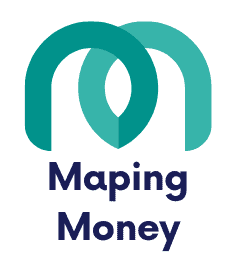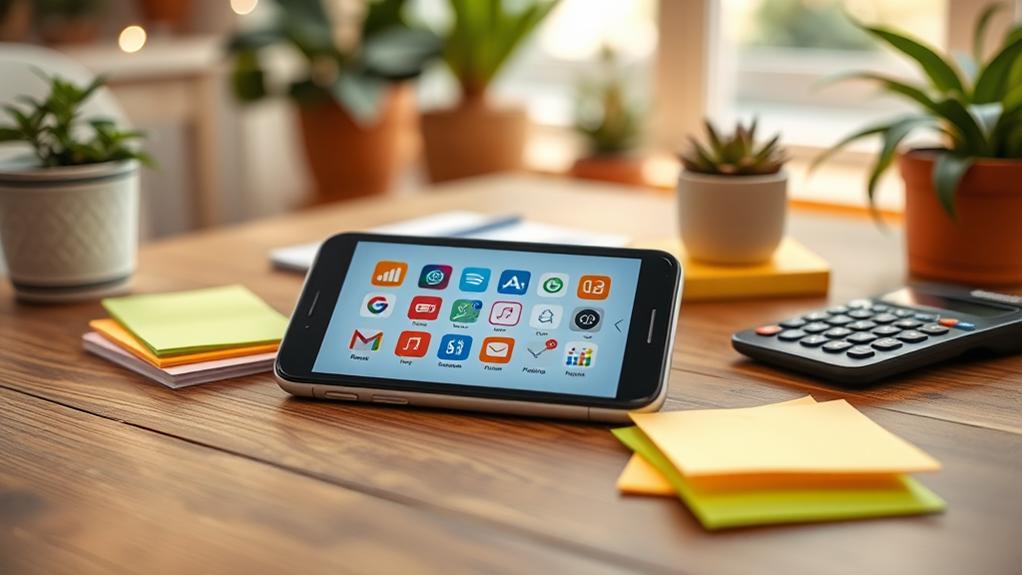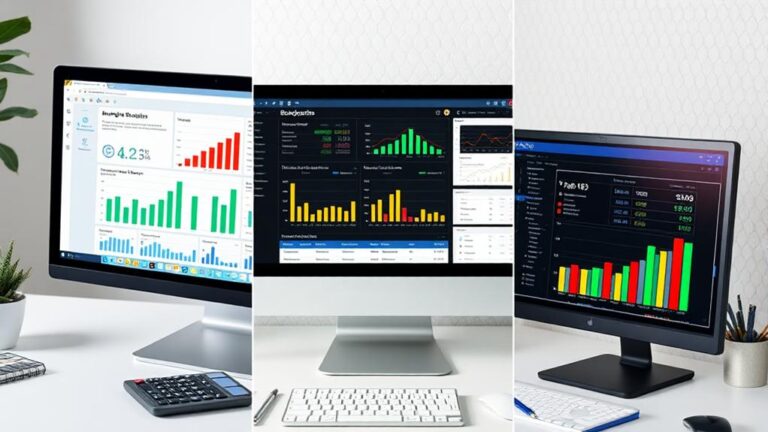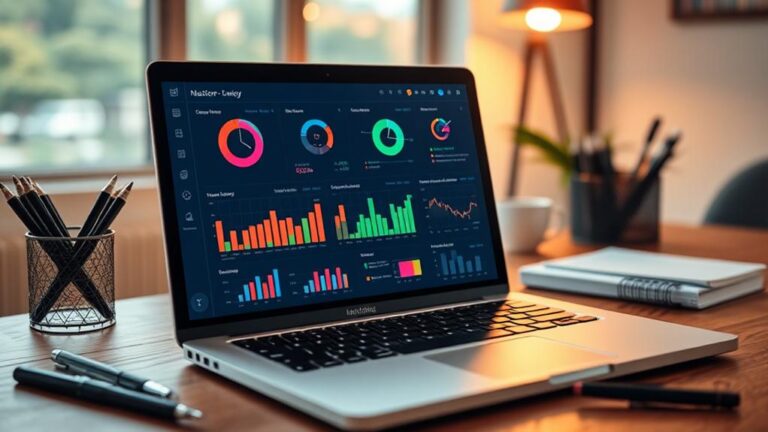5 Best Tips for Choosing Budgeting Apps
When choosing a budgeting app, start by identifying your needs. Consider your financial goals, like saving for a vacation or paying off debt. Assess app features, ensuring it has an intuitive design and the ability to track expenses easily. Check user reviews for insights into reliability and usability, focusing on balanced feedback. Also, prioritize data security by looking for strong encryption and privacy policies. Finally, think about the cost. Compare free options to subscription-based ones, ensuring the price aligns with the value you’ll get. Keep going to discover even more tips to enhance your budgeting experience!
Key Takeaways
- Define your financial goals and assess your spending habits to find an app that aligns with your needs.
- Look for user-friendly interfaces and customizable features that match your comfort level with technology.
- Ensure the app offers essential security measures like encryption and two-factor authentication to protect your data.
- Read user reviews to gather insights on app performance, reliability, and any common strengths or weaknesses.
- Compare costs and evaluate whether the app’s features justify the price, considering your budgeting frequency and needs.
Identify Your Budgeting Needs
Before diving into the world of budgeting apps, it’s crucial to identify your specific budgeting needs. Think about what you want to achieve: Are you aiming to save for a dream vacation, pay off debt, or simply track your daily expenses? Understanding your goals is the first step toward financial freedom.
Next, consider your spending habits. Do you prefer tracking every cent, or are you more focused on broader categories? Knowing whether you need detailed insights or high-level overviews will guide your app selection. Also, think about how often you’ll update your budget. Are you the type who enjoys daily check-ins, or do you prefer a weekly overview?
Don’t overlook your comfort with technology either. Some apps are user-friendly and intuitive, while others might require a learning curve. Choose one that feels right for you. Finally, consider whether you want multiple features, like bill reminders or investment tracking, or if a simple expense tracker suffices. By pinpointing your budgeting needs, you’ll empower yourself to choose an app that truly aligns with your financial journey, leading to a more liberated and informed approach to managing your money.
Assess App Features
When choosing a budgeting app, it’s essential to evaluate its features to guarantee it meets your needs. You want an app that empowers you, giving you control over your finances. Here are some key features to contemplate:
- User Interface: Look for an app that’s easy to navigate. A clean, intuitive design lets you manage your budget without frustration.
- Expense Tracking: Confirm the app allows you to track expenses effortlessly. The more automated this process is, the more time you save for what truly matters.
- Goal Setting: Opt for an app that lets you set financial goals. Whether it’s saving for a vacation or paying off debt, having a clear target can keep you motivated.
- Reporting and Analysis: Choose an app that provides insights into your spending habits. Understanding where your money goes is essential for making informed decisions and achieving financial freedom.
Check User Reviews
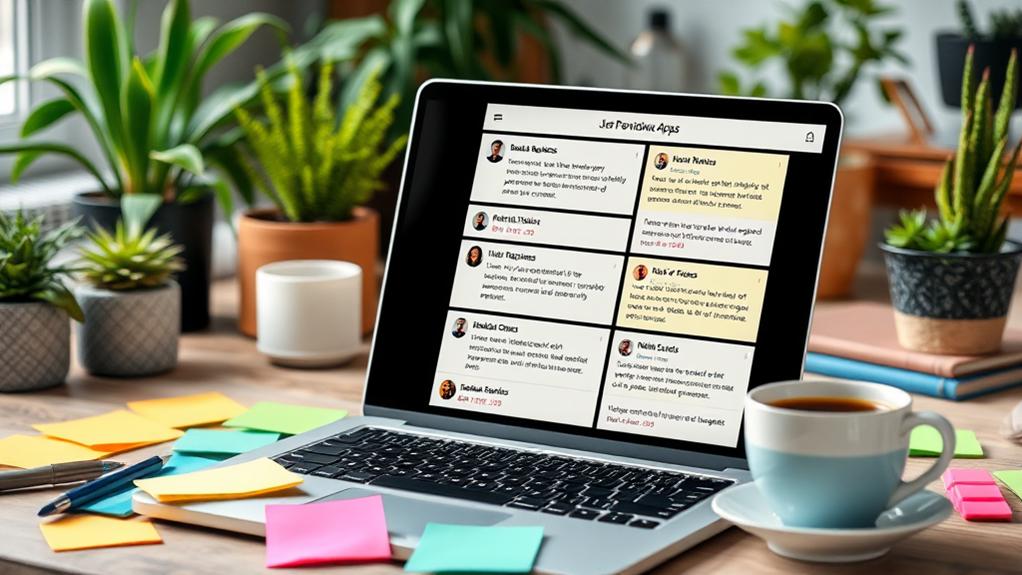
User reviews can be a treasure trove of insights when you’re selecting a budgeting app. You can tap into the experiences of others who’ve walked the same path, discovering what works and what doesn’t. Look for patterns in the feedback—if multiple users mention a particular feature that’s a game-changer, it’s worth taking notice.
Don’t just skim through the ratings; explore the written reviews. They often reveal the nuances that numbers can’t convey. You might find users praising the app’s user interface, ease of use, or customer support, which can help you gauge whether it aligns with your needs.
Beware of overly positive or negative reviews, though. Balance is key. A few one-off complaints or glowing endorsements might not reflect the app’s true performance. Instead, focus on detailed reviews that provide a well-rounded perspective.
Ensure Data Security
Guaranteeing data security is essential when choosing a budgeting app. Your financial information is private, and you deserve peace of mind knowing it’s protected. Here are some key factors to take into account:
- Encryption: Look for apps that use strong encryption methods. This protects your data during transmission and storage, making it harder for unauthorized users to access it.
- Two-Factor Authentication (2FA): Opt for apps that offer 2FA. This adds an extra layer of security, requiring you to verify your identity through a second method, like a text message or email, before accessing your account.
- Data Privacy Policies: Read the app’s privacy policy. Guarantee they don’t sell your data to third parties and that they operate transparently about how your information is used.
- Regular Security Updates: Check if the app is regularly updated to address potential vulnerabilities. A commitment to ongoing security improvements shows they prioritize your safety.
Choosing a budgeting app that emphasizes data security is a step towards taking control of your finances. With your information safeguarded, you can focus on achieving your financial liberation without fear.
Consider Cost and Value

In the domain of budgeting apps, cost and value play an essential role in your decision-making process. You don’t want to overspend on an app that doesn’t meet your needs. Always weigh what you’re getting against what you’re paying. Some apps are free, while others charge monthly or yearly fees.
Here’s a quick comparison to guide you:
| App Type | Cost |
|---|---|
| Free | No monthly fees |
| Subscription-based | $5 – $15/month |
| One-time purchase | $30 – $100 |
When you evaluate each option, think about what features you truly need. A free app might suffice for basic tracking, while a premium app could offer advanced features like investment tracking or personalized advice. Consider how often you’ll use these features and whether they justify the cost.
Frequently Asked Questions
Can Budgeting Apps Sync With My Bank Accounts Easily?
Yes, most budgeting apps sync with your bank accounts easily. You’ll link them securely, allowing real-time tracking of your finances. This connection empowers you to take control of your spending and savings effortlessly.
Are There Budgeting Apps Specifically Designed for Small Businesses?
Absolutely, you’ll find budgeting apps tailored for small businesses. They offer features like expense tracking and invoicing, helping you regain control of your finances. It’s time to liberate your entrepreneurial spirit and streamline your operations!
How Often Should I Update My Budget in the App?
You should update your budget regularly, ideally weekly or monthly. This keeps your financial goals clear and allows you to adapt quickly. Regular reviews empower you to take control of your finances and achieve your aspirations.
Do Budgeting Apps Offer Customer Support if I Have Questions?
Did you know that 70% of budgeting app users report needing customer support at some point? Most budgeting apps do offer assistance, so don’t hesitate to reach out if you’ve got questions or need help!
Can I Access My Budgeting App on Multiple Devices?
Yes, you can access your budgeting app on multiple devices, ensuring you always have your financial information at your fingertips. This flexibility empowers you to manage your finances anytime, anywhere, without limitations.
